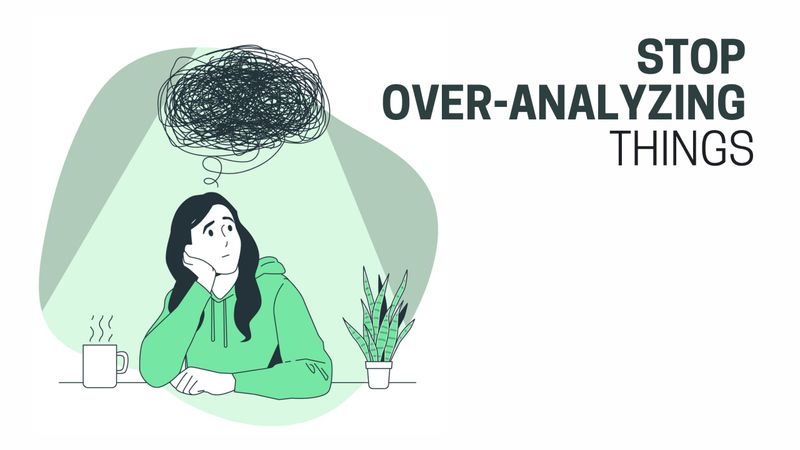You ever wonder why simple things feel impossible some days? Like you’re stuck in glue, watching everyone else run marathons while you just try to get out of bed. People toss around the word “lazy” like it’s a diagnosis, but that’s not the whole story.
There’s a deeper reason behind the struggle—something raw and real: emotional dysregulation.
This isn’t about motivation or willpower. It’s about your brain firing off alarms for things that others barely notice. If you’ve ever felt judged, misunderstood, or just plain worn down by your own reactions, you’re not alone.
Let’s call it what it is and talk about the signs that you’re not lazy—you’re up against something big, and it deserves honesty, not shame.
1. Everyday Tasks Feel Like Climbing Everest
Remember when doing laundry used to be a minor nuisance? Now it sits in the corner like a mountain daring you to try. You tell yourself you’ll get to it after one more episode, but hours pass and the weight grows heavier.
It’s not a lack of effort; it’s an avalanche of emotion that comes crashing down with each unfinished task. Sometimes it feels impossible to start, like your body’s anchored by invisible chains. People call it laziness, but they don’t see the war raging in your head.
Shame gets louder with every sock left on the floor. You want to fix it, but your brain throws up roadblocks you can’t always see. It’s like you’re frozen when you wish you could move and you’re not alone in this fight.
2. Mood Shifts Hit Like a Summer Storm
One minute you laugh about a group chat meme; the next, you snap at someone for a harmless comment. It’s not just a bad day—your emotions crash in fast, unpredictable waves.
There’s no gentle warning, just a sudden switch, and you’re left wondering what set it off. Sometimes it’s exhaustion, sometimes a single word or memory. Others assume you’re moody or dramatic, but you just try to keep your head above water.
The worst part? You can’t always explain it, even to yourself. These storms make you doubt your own stability. You crave calm skies, instead you just brace for the next downpour.
3. Impulse Decisions That Haunt You
Ever bought something expensive just because you felt empty and thought it might help? It’s not about loving new things—it’s the rush of doing something, anything, to fill the hole.
You might say yes to plans you dread or send a risky text you regret. Your brain chases relief in all the wrong places, then hands you a bag of guilt to carry home. People think you’re careless, but it’s more like being hijacked by your own feelings.
Later, you replay the moment and wish you could undo it. The regret stings worse than the impulse. You learn to forgive yourself eventually, but those moments stick with you longer than you’d like.
4. Relationships Feel Like High-Stakes Jenga
Friendships and love turn into balancing acts. Every conversation feels loaded, like one wrong word could send the whole thing crashing down. You hold your breath and hope this time you won’t mess it up.
The fear that you’ll say or feel the wrong thing keeps you walking on eggshells. You pull back before you even get close, just to avoid the fallout. People might call you distant, but you’re actually terrified of the collapse.
When things do fall apart, you blame yourself—for being too much, too sensitive, too unpredictable. Maintaining connections shouldn’t feel this hard, but with emotional dysregulation, it does.
5. You Carry Guilt Like It’s Your Purse
Some people forget their mistakes by bedtime. You keep yours close and replay awkward moments and missteps until they’re burned into your memory. It’s like carrying a purse of guilt you can’t set down.
You apologize more than you need to, afraid you’ve let someone down—even when you haven’t. The worry isn’t rational, but it feels real. It gnaws at you when you try to relax. Shame sneaks into quiet moments and turns them sour.
This isn’t just self-criticism; it’s an emotional loop that traps you. You want to be free of it, but the guilt feels safer than risking another mistake.
6. The Little Things Set You Off
Ever lost it over a dropped spoon or a bad Wi-Fi day? It sounds ridiculous, but in the moment, those little things set off a chain reaction inside you. It’s like your nerves are already frayed, and any small tug makes the whole thing unravel.
Other people shrug it off. You can’t. The emotional response feels out of proportion, but it comes fast and leaves you exhausted. Afterward, you’re embarrassed by how much it shook you.
You know it’s not about the coffee or the spoon. There’s just not much room left for surprises when you’re already stretched so thin. That’s not laziness—it’s surviving with an overloaded system.
7. You Avoid What Might Trigger You
Sometimes you plan your whole day around avoiding things you know might set you off. Maybe it’s a crowded event or a conversation that feels risky. You weigh every decision—will this be too much?
People think you’re antisocial or flaky, but it’s really just self-defense. You’ve learned the hard way that avoiding certain triggers can keep you from spiraling. It’s not about preference; it’s about survival.
Missing out stings, but the thought of feeling exposed or overwhelmed is worse. You wish you could just show up and be present, but right now, that’s a luxury you can’t always afford.
8. You’re Always on Edge, Even When It’s Quiet
Peace and quiet never feel truly peaceful. Even when the world goes still, your mind stays on high alert—waiting for the next thing to go wrong. It’s exhausting, this constant tension you can’t shake.
People ask why you can’t just relax, as if calm can be willed into existence. But anxiety sits in your bones and hums under the surface no matter what you do. You’re wired to expect trouble, even when nothing happens.
You crave rest, but your body refuses to believe it’s safe. So you lie awake, tired but unable to let go. Then you start to wonder why you can’t just be like everyone else.
9. You Replay Every Awkward Moment
Remember that thing you said in eighth grade? You do. Every embarrassing or tense moment sticks in your mind, to come back at the worst times. You replay these scenes on a loop, even though you wish you could hit stop.
Other people seem to bounce back from awkwardness, but you carry it for days, sometimes years. It’s not just overthinking—it’s a deep ache that clings to your self-worth.
Sleep is hard when your brain refuses to let old wounds heal. You wish you could forgive yourself and move on, but some tapes just won’t erase, no matter how much you try.
10. You Zone Out or Numb Out
At times your brain decides to check out completely. You scroll, you binge-watch, you let hours vanish because feeling nothing is better than feeling overwhelmed. It’s like your mind hits the emergency brakes.
This isn’t laziness; it’s survival. When emotions get too big, you shut down just to make it through the day. You look up and realize you missed dinner, missed texts, missed life.
You know it’s not helping, but sometimes, numbing out is the only way to cope. The trick is to forgive yourself for needing that break, even when others don’t understand it.
11. You Struggle to Calm Down Once Upset
Ever felt stuck in a bad mood you couldn’t shake? Once you’re upset, it feels like your emotions are driving and you’re just along for the ride. Calming down isn’t as easy as taking a few deep breaths.
Maybe you replay the argument in your head, or you feel the anxiety buzz hours after the stress has passed. Your body holds onto the feeling and refuses to let go.
You want to bounce back like other people seem to, but the echoes stick with you. It’s not about holding a grudge; it’s about not knowing how to let go.
12. You Overthink Conversations—Every Word Matters
Texting back shouldn’t be a full-contact sport, but for you, every word is a potential landmine. You read and reread messages. You worry about being misunderstood or upsetting someone.
You analyze tone, punctuation, emoji choices. Did you say too much? Too little? Your hands sweat, your brain spin. You want connection, but even simple chats become emotional puzzles you can’t solve.
This isn’t about being dramatic—it’s about wanting to be seen and not rejected. The mental gymnastics drain you, but they’re how you protect yourself, even if it never feels like enough.
13. You Feel Misunderstood—Like an Alien in Your Own Life
It’s hard to shake the feeling that you’re fundamentally different from everyone else. At parties, at work, even in your own family, you watch people connect while you feel miles away. There’s a loneliness that sits deeper than being alone.
You get used to pretending, to nod along so no one asks questions. But inside, you wonder why you can’t just fit in or let things roll off your back. The sense that you don’t belong can sting worse than any criticism.
You long for someone to really see you—to understand the silent battles you fight. Until then, you wear the mask and hope no one sees the cracks.
14. You’re Hyperaware of Others’ Moods
You walk into a room and instantly scan for danger—who’s upset, who’s angry, who’s just a little off. Your brain reads every sigh and eyebrow raise like it’s written in neon. You can’t help it.
It’s exhausting to be on constant alert and worry you’ll set someone off or somehow make things worse. Small shifts in energy send your own feelings spinning, even if it has nothing to do with you.
You want to relax, but instead you play emotional detective. You try to stay safe in a world full of unspoken signals. Once in a while, you just wish you could tune out and breathe.
15. You Can’t Trust Your Own Reactions
You never quite know how you’ll react to things. One day, a comment rolls off your back; the next, it wrecks your whole mood. The unpredictability makes you doubt yourself.
You ask yourself: “Am I overreacting? Is this a big deal or am I just tired?” You want so badly to trust your own instincts, but your feelings keep rewriting the rules.
This uncertainty feeds your anxiety and leaves you second-guessing even small choices. It feels like your emotions have a mind of their own and you’re just along for the ride. Every day, you hope today won’t spin out of control.
16. You Feel Like a Failure, Even When You’re Trying
You work hard—maybe harder than anyone knows. But the little things you don’t finish pile up, and suddenly you feel like you’ve let everyone down. Even small setbacks make it feel like you’re failing at life.
Maybe it’s missed deadlines, forgotten appointments, or just not having the energy to show up. The shame builds and builds. People say you should just try harder, but they don’t see how hard you’re fighting just to keep going.
You wish effort counted for more. Because, surviving the day is an accomplishment, even if no one else gives you credit for it.

















